The photos from Saturday’s ordination are the property of John Casamento. www.johncasamento.com
A caress from God
St Josemaría Escrivá recalls an experience preparing for his First Holy Communion. A barber was engaged to curl the ten-year-old’s hair, because curling boys’ hair was apparently the fashion then. The barber accidentally burned the boy’s scalp with a hot burning iron — bad enough that it left a life-long scar. Josemaría jumped with a start, but then he suffered in silence, because he had learned what so many of us were also taught as children: “Offer it up.”
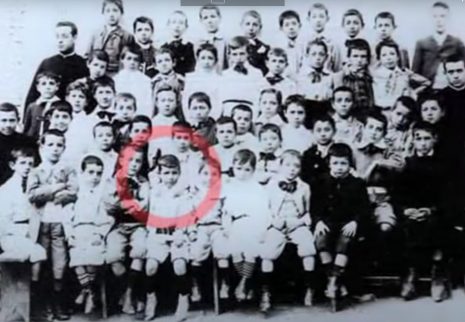 St Josemaría Escrivá’s First Holy Communion Day, 23 April 1912.
St Josemaría Escrivá’s First Holy Communion Day, 23 April 1912.Thirteen years later, on the day of his first Mass, Fr Josemaría looked forward to his recently-widowed mother being the first to receive holy communion from him. But at the last minute, a pious but pushy old lady shouldered her way to the communion rail, and knelt down first. The young priest felt obliged to minister to that good woman first, so as not to snub her.
Each of these incidents — small in the scheme of things, but costly in that instant — were viewed by Josemaría as ‘a caress from God.’ Throughout his life, he found that on days of special significance, this is how God would announce His presence: a painful moment, which became sweet when viewed with supernatural outlook.
I bet all of us, when we reflect on our lives, can discern a similar pattern.
Certainly, those of us who have known James Baptist for a long time can see how the shadow of the cross has loomed over Fr James’ journey. The cross is a worthy subject to meditate on at a new priest’s first Mass. But it’s also good to supernaturally frame the many obstacles and setbacks which have preceded this blessed day in Fr James’ life. There are no villains or enemies in this story — just ministers of God’s loving caress.
The Cross
It’s easy to romanticise the cross. When we imagine the crosses that might visit us in our lives, we imagine challenges which are more difficult, and less specific, than the reality. Crosses which are dramatic! Heroic!!
But most of the crosses God sends us aren’t romantic at all: fatigue, illness, distress, failure, misunderstandings. These are the crosses which sanctify us.
There’s a great scene in Mel Gibson’s The Passion of the Christ which holds a mirror, I think, to how you and I — or most of us anyway — respond to the cross. When a soldier drags Simon of Cyrene from the crowd, and demands he help Jesus with his cross, Simon is surprised. Angry. Resentful.
Don’t we react the same way? Fatigue or failure or misunderstanding visits us. And we respond with surprise, or anger, or resentment.
But Simon of Cyrene is open to grace. He recognises that it’s through this unwelcome cross that he encounters Jesus.
Isn’t it true that as soon as we cease to be afraid of the Cross — when we happily accept the Will of God — then we find happiness? And all our worries, all our sufferings, physical and moral, pass away? — St Josemaría Escrivá.
A theology of vulnerability
I want to share a quote from someone. Not a famous saint — not yet — but someone nonetheless familiar to everyone here:
I have experienced what vulnerability feels like through various events in my life. At first, I felt empty and alone, not knowing how to live with what I was going through. But the more I asked God how to deal with my own vulnerability and my lack of trust, the more He pointed me towards a way of embracing my vulnerabilities in a way that would surrender control to Him. I learned in a very personal way the reality that it is God, and God alone, who defines me. I took great comfort in a particular verse of scripture: “For the sake of Christ, then, I am content with weaknesses, insults, hardships, persecutions, and calamities; for when I am weak, then I am strong.” (2 Cor 12:10)
These are words from an excellent essay which develops “a theology of vulnerability.” Written by one James Baptist. Now Father James Baptist.
We can see, can’t we?, how so many “caresses from God” have not only shaped but profoundly enriched the priestly ministry Fr James begins today. He writes eloquently of light and darkness, strength and weakness, vulnerability and courage, because he has lived it. This will make Fr James an effective priest, capable of true compassion and connection.
Sometimes in life, we’re called — all of us are called — to minister to someone who’s stuck in a dark place.
It’s easier, and very tempting, to flood that space around them with light. Say the right thing. Furnish the answers. But this doesn’t always serve the purpose. Flooding an environment with light is not much good to a person who is so overwhelmed that they will turn away from the light. We all know the experience, after a long time in the dark, of shielding our eyes from sudden light.
It’s much harder — but also more Christ-like — to climb down into the dark, and be really present to a person who is suffering. To stay at their side, knowing there is nothing we can say or do, except maybe: “I don’t even know what to say right now, but I’m grateful to be here with you.” That costs a lot, because it means revisiting the darkness we have navigated in our own lives. But this is what Christ modelled for us, when he “emptied himself, taking the form of a servant, being born in the likeness of men. And being found in human form he was humbler yet and became obedient unto death, even death on a cross.” (Phil 2:7-8.)
Eucharistic piety
We’re gathered here today not only to give thanks that Fr James is now a priest, but also to pray for this young priest.
Yesterday, at his ordination, James received gunpowder! But lukewarmness, indifference, self-love, neglect of prayer . . . all these things threaten to pour water over that gunpowder. What good is wet gunpowder?
We want Fr James to set the world on fire! To be the priest he wants to be. To be the priest the world needs him to be. To be faithful to this lesson of the cross which God has lovingly shared with him.
One of the greatest means available to priests is eucharistic piety. (Piety, by the way, has unfairly assumed a bad reputation. Another word for ‘pious’ is ‘tender.’ That has less to do with externals, and more to do with the interior life.) So let’s pray, especially and concretely, for Fr James’ eucharistic piety:
We pray, Lord, that the Tabernacle is always a magnet in Fr James’ life. This is where he hastens when he’s very happy. And where he goes when he’s sad.
We pray that the Tabernacle is a book end in Fr James’ day. Where he starts every day. Where he ends every day.
Most of all we pray, Lord, that the Eucharist is always the source and summit of Fr James’ life. That what he invests in today’s Mass, he invests in every Mass, every day, for the rest of his life. That he makes his own, and practises every day, that noble aspiration:
“Priest of Jesus Christ, celebrate this Holy Mass as if it were your first Mass, your last Mass, your only Mass.”
Amen.
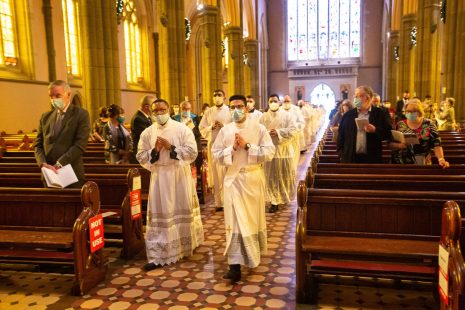 The ordinands process in, with a peculiarly 2020 look!
The ordinands process in, with a peculiarly 2020 look!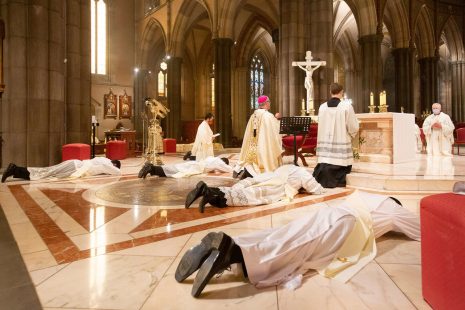 The candidates lie prostrate before the altar, as the Archbishop and the people beseech the saints to intercede for them.
The candidates lie prostrate before the altar, as the Archbishop and the people beseech the saints to intercede for them.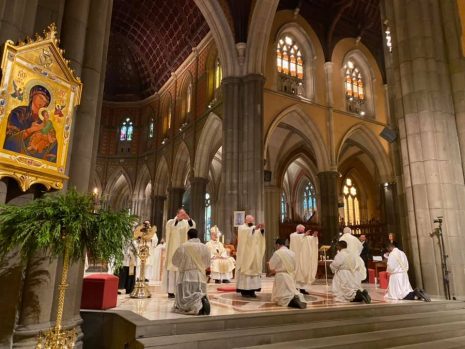 Concelebrating priests ‘lay hands’ while also observing social distance. (The Archbishop made actual physical contact when he laid hands!)
Concelebrating priests ‘lay hands’ while also observing social distance. (The Archbishop made actual physical contact when he laid hands!)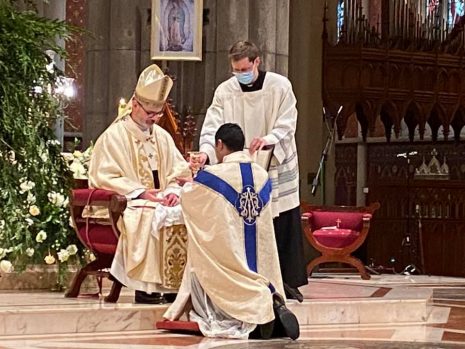 Fr James receives the chalice and paten: “Receive from the Holy People of God the gifts to be offered to God. Know what you do, imitate what you celebrate, and conform your life to the mystery of the Lord’s cross.”
Fr James receives the chalice and paten: “Receive from the Holy People of God the gifts to be offered to God. Know what you do, imitate what you celebrate, and conform your life to the mystery of the Lord’s cross.”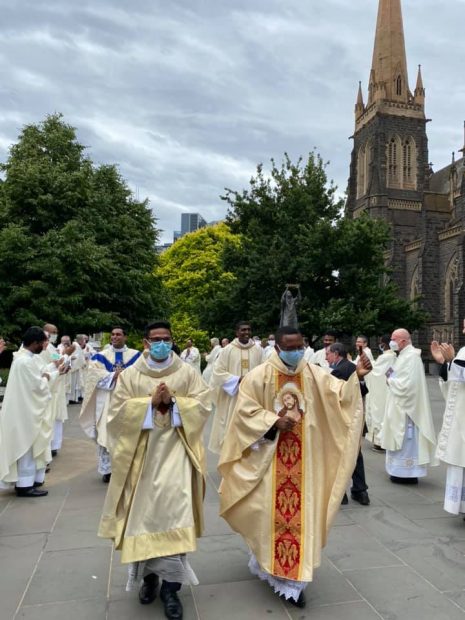 The newly ordained, again with distinctive masks, are congratulated by their presbyteral co-workers.
The newly ordained, again with distinctive masks, are congratulated by their presbyteral co-workers.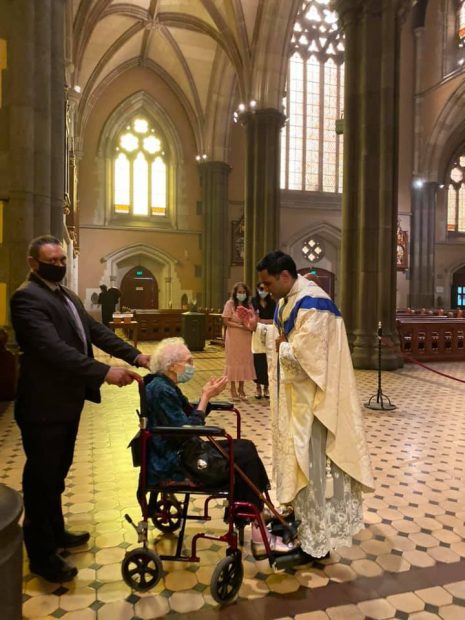 Fr James ministers a blessing to his grandmother, while his family watches.
Fr James ministers a blessing to his grandmother, while his family watches.
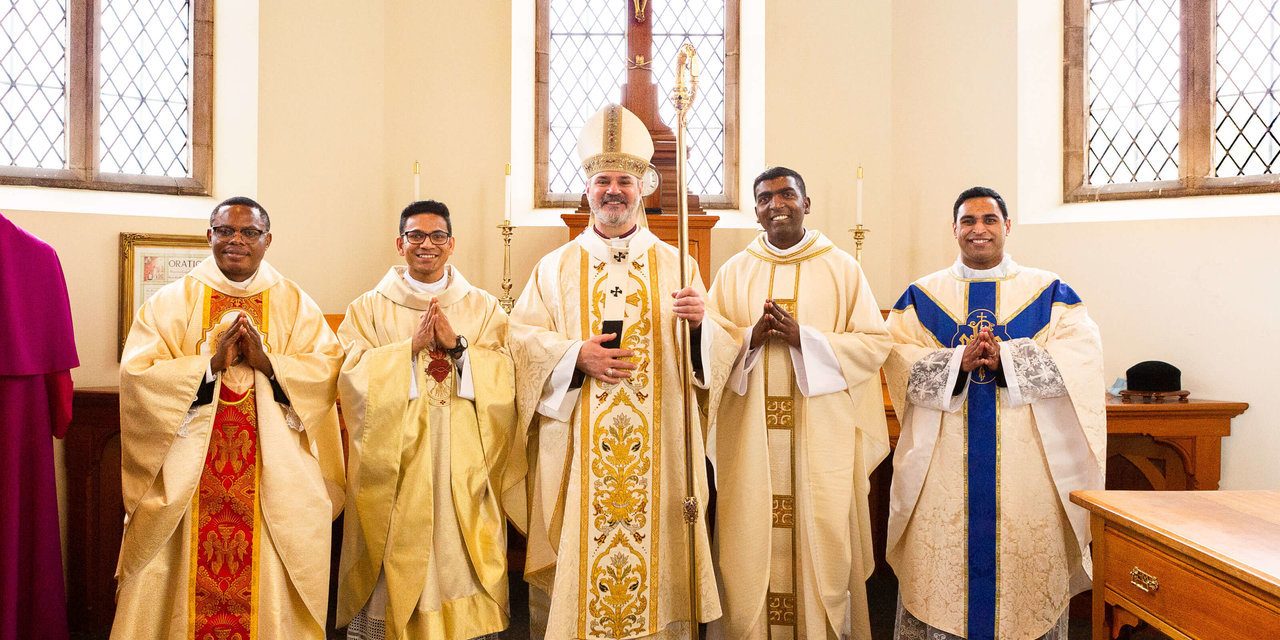
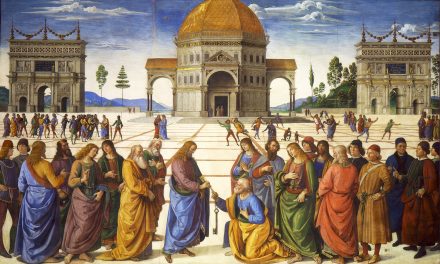

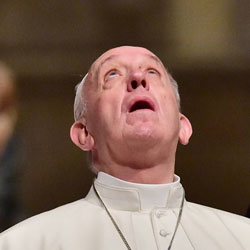

Recent Comments